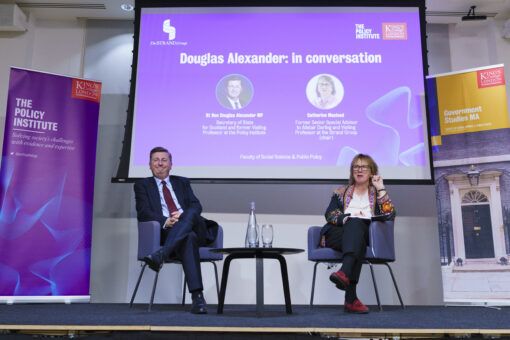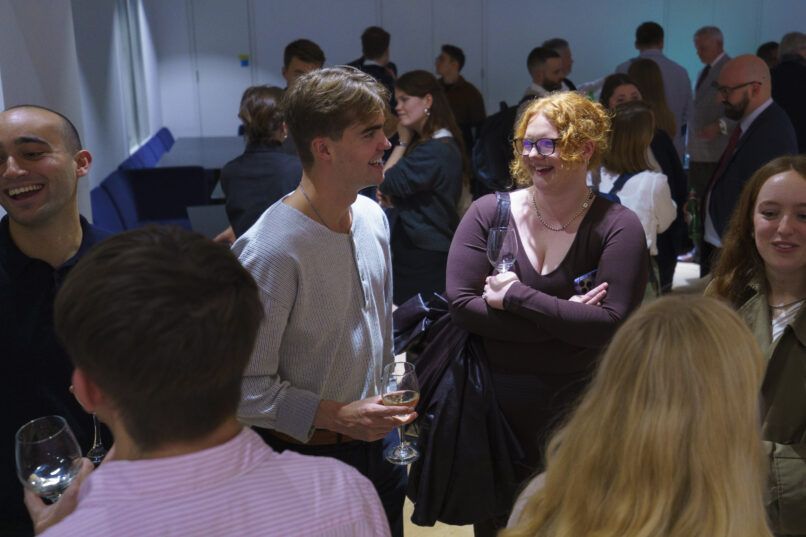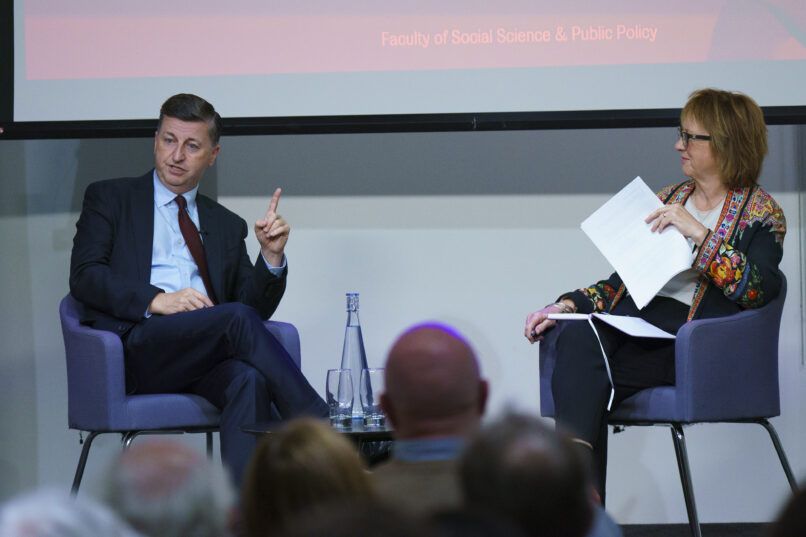
Tom Turner
MA Government Studies Student 2025
Reform strikes me as an extraordinarily bad answer to some really good questions… we need to be the people answering those questions
Wednesday 15th October saw the 78th Strand Group event, in partnership with the Policy Institute: In Conversation with Douglas Alexander.
Douglas is the MP for Lothian East and was appointed Secretary of State for Scotland on the 5th of September 2025. It is worth mentioning that Douglas also served under Tony Blair and Gordon Brown – holding this same Cabinet position from 2006 to 2007.
Alexander did not disappoint as the first serving Secretary of State to front a Strand Group event.

Talking to Catherine MacLeod – former Senior Special Adviser to Alistair Darling – Douglas spoke candidly about his upbringing, how he began his political career, and his diagnosis of contemporary British politics.
Douglas was born in Glasgow and spent much of his childhood in the bordering council of Renfrewshire. His mother (a doctor) and father (a Church of Scotland minister), instilled into him a sense that “a meaningful life is a life of service.”
He became a member of the Labour Party in 1982, when he was just 14 years old. For context, Renfrewshire was hit hard by deindustrialisation which had been catalysed in 1979 following Margaret Thatcher’s first election victory.
After an impressive run through school and university, which culminated in a first-class degree from the University of Edinburgh, Alexander found himself working in the office of a fellow first-class UoE alumnus: Gordon Brown.
Douglas spoke of his time in Brown’s parliamentary office fondly – he had a front-row seat as Gordon and Tony Blair (whose office was next-door) discussed their vision(s) for Britain whilst serving in Neil Kinnock’s Shadow Cabinet.
Alexander then returned to Edinburgh and obtained an LLB before qualifying as a solicitor; working for a firm which provided legal services to Trade Union members. This was relatively short-lived, however, as he became MP for Paisley South in 1997 following a by-election.
And so began his career as an MP. I won’t spend too much time laying out his New Labour credentials, but it is important to note his relatively speedy accession into becoming a Minister of State in 2001 and his Cabinet appearances which began in 2005.
Alexander remained a Labour MP following the 2010 general election and held multiple Shadow Cabinet positions; he also played a part in the victorious pro-UK Better Together campaign during the 2014 Scottish independence referendum. More on this later.
In 2015, he lost his seat to 20-year-old Mhairi Black of the SNP. On his concession speech, Douglas recalled seeking the advice of his best-man who reminded him that his family may well “sneak onto a computer in the future and look this moment up… so make a speech that makes them feel proud.”
This marked the beginning of a busy 9-year period outside of public office and inside the private sector, including as a visiting professor at King’s College London. I can’t help but mention that he presented a BBC Radio 4 programme entitled: “A Guide to Disagreeing Better” during this period. If only this were mandatory listening.
Douglas was re-elected in 2024 and immediately made a Minister of State, going on to become the Secretary of State for Scotland on 5 September 2025.
So, it’s safe to say that Douglas is well-placed to provide insight into British politics. It showed – I really encourage anyone to watch the full interview.

Here, however, I want to focus on two somewhat related takeaways. Firstly, his deft analysis of the obstacles faced by progressive politics. Secondly, the lessons of the 2014 and 2016 referendums. Put together, I think we get an interesting insight into the Labour Government’s current thinking.
Obstacles for progressive politics:
For Douglas, progressive politics has been disrupted by “an extraordinarily powerful set of forces:”
- Economic anger: “you can’t basically have flat wages for fifteen years without political consequences.” Or, in the words of the American economist Larry Summers: “weak economics makes for angry politics.”
- Political alienation: “a sense that… politics is a battle between an elite, out of touch, probably corrupt [group of] insiders, and a pure, authentic public on the outside.” This is also represented as “the move from left / right politics to insider / outsider politics.”
- Cultural anxiety: “a sense that the country is changing in ways that people felt they didn’t vote for.”
Economic anger, political alienation and cultural anxiety are not new concepts; by looking at the last decade with those 3 precedented factors in mind, the current unprecedented times begin to feel less daunting.
However, it is only by learning the lessons from when these forces have driven politics in the past that effective solutions can be thought up and implemented today.
Lessons from the referendums:
For Douglas, the “central defining question of the last decade” has been “Who are we [the United Kingdom]?”
This tracks.
10 years ago, I was 11 years old. My first political memory was to come a year later when I was getting ready for school on the morning after 2016’s Brexit referendum.
Despite being too young to fully appreciate what the result meant, I could tell from my parents’ reactions that something ‘unprecedented’ had happened. ‘Unprecedented’ seems to summarise the proceeding decade well.
Just two years before, however, Scotland had answered the same “Who are we?” question; a clear majority (55% vs 45%) concluded that Scotland ought not to be an independent country, instead it should stay within the UK.
Alexander was adamant that the Better Together (pro-UK)campaign prevailed because they focused on a conversation “in Scotland, by Scots, about Scotland’s future.” This, of course, included facts and figures. However, because of the real passion on both sides of the debate, they accepted the need “to bring lyricism, poetry, emotion” to their campaign.
Remain “catastrophically misread the lessons of the 2014 referendum.”
“Politics is about storytelling as much as it is about statistics.” Turning up to an electoral contest with a spreadsheet is “like turning up to a knife-fight with a teaspoon.”
In other words, the staunch focus on the likely consequences for the British economy outside the EU was a “loser’s argument.” Politics is partly, and importantly, about emotion. Simply pointing to statistical evidence when you’re up against someone who can mobilise emotion will see you on the losing side.
Alexander aptly quoted Hume: “we are feeling beings with thoughts; we are not thinking beings with feelings.”
Thus, politics is partly the “art of competitive storytelling.”

Transposing these insights to today:
Keir Starmer faces an immense challenge: to demonstrate that progressive politics (still facing those disruptions) can make people feel better whilst simultaneously competing against the de facto opposition of Reform UK – a party that excels at mobilising emotion.
For Douglas, “the most effective way to vaccinate the country against the appeal of Reform is to be an effective, purposeful government.”
However, it is also “profoundly wrong” to think that the answer to populism is to give up on storytelling. “In a post-truth, post-trust world… the authenticity of the storyteller determines whether people believe the facts or not.”
It follows from these two points that Douglas would characterise the current challenge for the Government as something like: to be effective and purposeful whilst ensuring that the public are a willing audience to the narrative.
Starmer is not known for his storytelling wizardry. However, it does seem as though it is increasingly part of the Prime Minister’s homework. This was most evident at the Labour Party’s conference, where the leader’s speech aimed to answer that same defining question: “Who are we [the Labour Party / Government]?”
The answer? A party and government for “patriotic national renewal.” For Douglas, what Keir set out in Liverpool was “quite a majoritarian view,” targeting “mainstream Britain who don’t spend their time on Twitter [now X].” In his mind, it was “the closest to what we had” with New Labour.
Only time will tell how effective this narrative is. However, it is one thing implementing sound policy and another convincing the electorate that you are.
Douglas was confident that Labour can defeat Reform. After listening to him, I have to say it is no surprise that Starmer wanted Alexander in his Cabinet and co-chair of the Scottish election campaign ahead of May 2026.